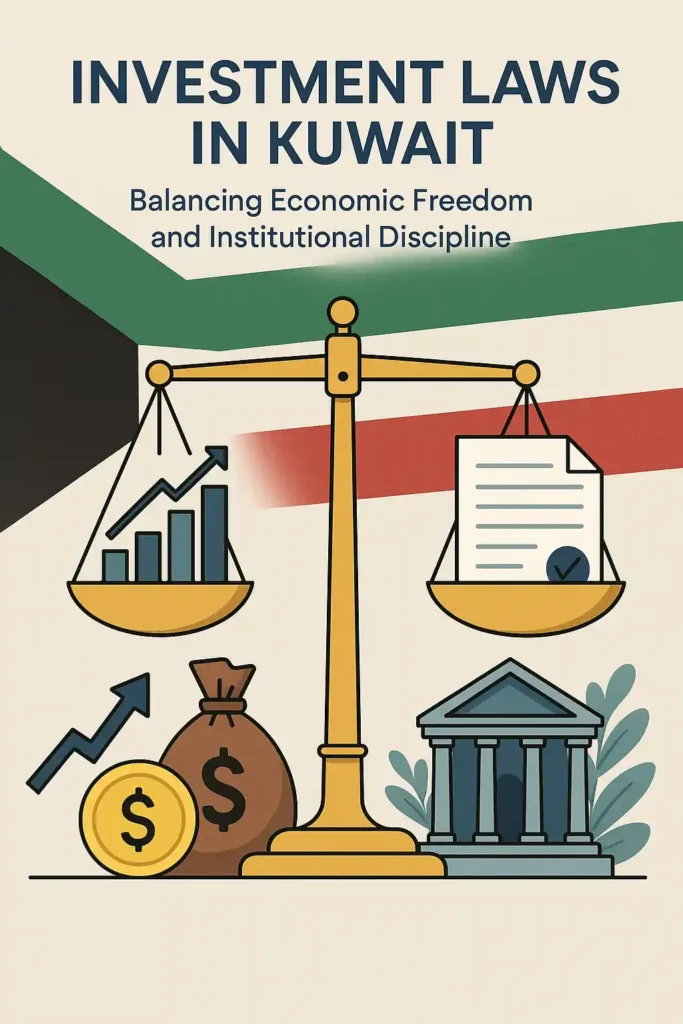

Since 2010, the Global Law Experts annual awards have been celebrating excellence, innovation and performance across the legal communities from around the world.
posted 4 months ago
Given the significant role played by financial institutions such as banks, finance companies, insurance, and investment firms in supporting the economy and achieving financial stability, there is a pressing need for a fundamental tool to regulate their operations and ensure their adherence to professional and ethical standards, in addition to protecting client rights.
The more comprehensive the legislative framework, the more immune financial institutions become against crises, providing them with the necessary confidence to offer their diverse financial services, including lending, financing, investments, and asset management, among others.
The Kuwaiti legislative framework regulating financial and investment operations is based on a set of fundamental laws, foremost among them Law No. 32 of 1968 concerning the Central Bank, which defines the powers of the Central Bank of Kuwait in regulating banking operations and monitoring liquidity and credit. This law allows the Central Bank to issue regulatory instructions that ensure the soundness of banks’ conditions and limit systemic risks that may affect the economy.
Commercial and investment company laws also regulate the work of non-banking financial institutions, such as finance and investment companies. Investment companies are also subject to the supervision of the Capital Markets Authority according to Law No. 7 of 2010 establishing the Authority, which aims to regulate and monitor the financial market and enhance transparency and fairness in financial transactions.
Anti-money laundering and counter-terrorism financing laws are a pivotal part of this legislative framework, in accordance with Law No. 106 of 2013 on combating money laundering and terrorism financing. This law imposes on financial institutions the obligation to implement customer due diligence procedures, report suspicious transactions, and enhances the role of regulatory bodies in monitoring illicit activities.
This law contributes to ensuring customer rights by obligating financial institutions to be transparent, fully disclose the terms of financial services and products, and provide means for grievances and dispute resolution. One of the most prominent examples of this is the instructions issued by the Central Bank of Kuwait regarding the protection of bank customers’ rights, which included the necessity of obtaining clear consent from the customer before imposing any fees or interest, and providing channels for complaints and responding to them within a specified timeframe.
In the capital market, the Capital Markets Authority imposes strict rules to ensure investor protection, requiring listed companies to periodically disclose their financial results, and prohibiting insider trading. This is essential to achieve fairness and equal opportunities among all market participants. In the event of default or breach, the law allows for rapid intervention by regulatory authorities, whether through restructuring the institution or liquidating it in a manner that preserves depositors’ funds and limits financial contagion.
Kuwait is also seeking to enhance personal data protection in light of digital transformation, through a draft data protection law expected to be issued soon, which will have a significant impact on financial institutions in terms of how data is collected, used, and stored.
After this overview, it can be said that the existing financial legal framework represents a safety valve for the Kuwaiti economy and a fundamental support for government efforts to attract foreign investments into the country. With ongoing legislative updates, the required flexibility is provided for this legal framework to protect customer rights and enhance investor confidence within a balanced regulatory framework that combines economic freedom and institutional discipline, maintaining the robustness and sustainability of our financial system.
Author


No results available
posted 18 hours ago
posted 1 day ago
posted 3 days ago
posted 3 days ago
posted 3 days ago
No results available
Find the right Legal Expert for your business
Global Law Experts is dedicated to providing exceptional legal services to clients around the world. With a vast network of highly skilled and experienced lawyers, we are committed to delivering innovative and tailored solutions to meet the diverse needs of our clients in various jurisdictions.

When your international business faces financial distress, quick action is key! 🔑 Negotiating with creditors, restructuring debt, and understanding insolvency laws can help regain stability. Global Law Experts is here to guide you through your options.
🌍Explore the details on our website.
🔗Link in bio
#GlobalLawExperts #CommercialLaw #BusinessLaw #LegalAdvice #BusinessGrowth #LegalTips #BusinessStrategy #LegalCompliance #Law #LegalKnowledge #LegalAwareness #Law101 #LegalEducation #IntellectualProperty

Running a business is hard enough — lawsuits shouldn’t make it harder. 🚫 Protect your business with the right legal strategies and expert tools from Global Law Experts. Let’s secure your future together! 💼
🌍Explore the details on our website.
➡️www.globallawexperts.com
#GlobalLawExperts #CommercialLaw #BusinessLaw #LegalAdvice #BusinessGrowth #LegalTips #BusinessStrategy #LegalCompliance #Law #LegalKnowledge #LegalAwareness #Law101 #LegalEducation #IntellectualProperty #Infringed #Ecommerce #LegalBranding

Using NRIC numbers as passwords or identity proof? That era is done. Strengthen your security with multi-factor authentication and biometrics—because your clients' trust depends on it.
#SingaporeLaw #DataPrivacy #CyberSecurity #PDPA #NRIC #MFA #StrongAuthentication #LegalCompliance #ClientTrust

Swiss law protects secured lenders—with precision. From real estate to IP and bank accounts, every asset counts—just as long as it’s defined, documented, and delivered.
#SwissLaw #SecurityInterest #Collateral #InternationalLending #SwissFinance #LegalCompliance #GlobalBusiness #AssetSecurity

Gold trading in Saudi Arabia isn’t just a business—it’s a lab test, a permit, and a legal tightrope. Want to succeed? Start with compliance, hallmarking, and permits—or risk losing it all.
#GoldTrading #SaudiLaw #PreciousMetals #BusinessSetup #LegalCompliance #GlobalBusiness #SaudiArabia #TradeRigour

Second citizenship isn’t permanent—especially if you break the rules. Know the risks and how to safeguard your status: be transparent, stay lawful, and honour all citizenship requirements.
#SecondCitizenship #CitizenshipRisks #DualNationality #Compliance #GlobalMobility #LegalAdvice #ImmigrationLaw

Send welcome message